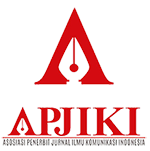IMPLEMENTASI MANAJEMEN KOMISI PENYIARAN INDONESIA DALAM MENGAWAL ISI SIARAN TELEVISI
Abstract
Many interests dealing with television business effect on programs to gain demands of the market. Television programs are analogous to products or goods that are sold to other parties, in this case the audience and advertisers. The more audiences want goods (programs), the more interests that can influence on economy, social and cultural interests and also political interests. The implication is that goal of making programs are always directed to profit oriented. The Indonesian Broadcasting Commission (KPI) has its tasks to guarantee the community to have information that is appropriate and correct in accordance with human rights (Broadcasting Law 32/2002 Article 8 verse 3a). This study aims to determine the management implementation of the Indonesian Broadcasting Commission in monitoring and overseeing the content of Indonesian television broadcasting to establish healthy television programs. This study uses management theory consisting of planning, organizing actuating, controlling with constructive paradigms, qualitative approaches and descriptive methods. The results shows that KPI has implemented planning, organizing, actuating, controlling in carrying out the task of monitoring and overseeing television programs.
Full Text:
PDFReferences
Assegaff, Djafar H. 1994. Konglomerasi Taipan, dan Koneksi Bisnis. Jakarta: Warta Ekonomi.
Bungin, Burhan. 2008. Konstruksi Sosial Media Massa Kekuatan Pengaruh Media Massa, Iklan Televisi dan Keputusan Konsumen serta Kritik Terhadap Peter L Berger & Thomas Luckmann. Jakarta: Kencana Prenada Media Group.
Djamal, Hidayanto dan Andi Fachruddin. 2011. Dasar-dasar Penyiaran. Jakarta: KCN.
Herbert, Zettl. 2012. Television production handbook. 8. USA: Thomson Wadsworth Belmont.
Howard J.Blumenthal & Oliver Goodenough. 1991. This Business of TV. NY: Bill Board Books.
Limburg, E.Val. 1994. Electronic Media Ethics, Focal Press, Boston-London
McLuhan, Marshall (1964/2006). Understanding Media.Routledge Classic Publisher, New York.
McQuail, Denis. 2003. Teori Komunikasi Massa Sebuah Pengantar edisi ke 2. terjemahan. Jakarta: Penerbit Erlangga.
Masduki. 2001. Jurnalistik Radio, Menata Profesionalisme Reporter dan Penyiar. Yogyakarta: LKIS.
Michael S.Kievmann & Howard Herbert H.1986. Radio and TV Programming. Macmillan Publishing Co.,NY
Miller, Toby. 2010. Television Studies The Basics. NY: Routledge.
Morrisan. 2009. Manajemen Media Penyiaran Strategi Mengelola Radio & TV. Jakarta: Pranada Kencana.
Naratama. 2013. Menjadi Sutradara Televisi. Jakarta: PT.Grasindo.
Potter, W. James. 1998. Media Literacy. CA: Sage Publications, Thousand Oaks.
Siregar, Ashadi. 2001. Menyingkap Media Penyiaran: Membaca Televisi-Melihat Radio. Yogyakarta: LP3Y.
Ishadi, SK. 2010. Media dan Kekuasaan. Jakarta: Gramedia.
Straubhaar, dkk. 2012. Media Now-Understanding Media, Culture and Technology. Boston: Wadsworth.
Undang-Undang
Republik Indonesia. Undang-undang Republik Indonesia Nomor 32 Tahun 2002 tentang Penyiaran. LNRI tahun 2002
Makalah
Abimayu, Anggito. (17 Desember 1994) Orientasi Usaha dan Kinerja Bisnis Konglomerasi Seminar Nasional Industri Oligopoli dan Konglomerasi di Indonesia. Yogyakarta. Fakultas Ekonomi, Universitas Islam Indonesia (UII).
DOI: https://doi.org/10.32509/pustakom.v1i2.715
Refbacks
- There are currently no refbacks.
Copyright (c) 2019 JURNAL PUSTAKA KOMUNIKASI
Indexed by:
Recommended Tools :
Jurnal Pustaka Komunikasi
Fakultas Ilmu Komunikasi, Universitas Prof. Dr. Moestopo (Beragama)
Kampus I, Jl. Hang Lekir I/8 Jakarta Pusat, Indonesia 10270
WA: 085714422271 (Chat Only)
email: pustakom@dsn.moestopo.ac.id
Copyright (c) 2025 Jurnal Pustaka Komunikasi
Licensed under a Creative Commons Attribution-ShareAlike 4.0 International License.














